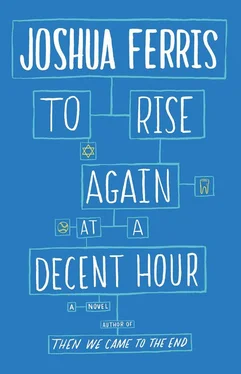“You think that’s gross, I’ll invite you over next time I’m extracting an impacted molar. You grab on tight with your cowhorn and do a bunch of figure eights, then you make that last pull and sometimes it’s like you can see the nerves still wiggling as you set the tooth on the tray.” He looked horrified. “You’re probably better off making money,” I said.
“When you break it down like that,” he said.
He stood and walked his trash over to a bin. I hadn’t expected to like him.
I’d watched the clip the day before. It showed Mercer testifying before the U.S. House Oversight and Government Reform Committee about the financial crisis of 2008. He had bet against the system and made a killing. This, he said unironically, was the paradox that proved that the system worked. The representative from California expressed some disagreement and pressed Mercer to explain his “good fortune.” “Good fortune had nothing to do with it,” Mercer countered, and followed with a detailed account of his thinking toward the end of ’07, the folly of an extended period of no-money-down mortgages and the displacement of risk away from its source with unregulated vehicles like credit-default swaps. He was just doing the counterintuitive thing, which, in another paradox dictated by market logic, was really the intuitive thing. “The history of making money in this country is a history of exploiting the policy makers,” he said. “Liberal, conservative, Democrat, Republican — it doesn’t matter. Let the policy makers act, and then study the places ripe for exploiting. Are they lending without interest? Attack the asset bubble. Currency pegs? Short foreign debt. The policy makers are there to protect capitalism, and America more generally. We’re there to be smarter than the policy makers,” he said to the policy maker.
He continued: “If I may make an analogy, Mr. Waxman, that must seem very remote to us now, I would suggest that the economic establishment in America, and really everywhere in the developed world, resembles in terms of concentration of power and ease of corruptibility the Catholic Church in the centuries leading up to the Protestant Reformation. It is a system controlled by a small number of insiders who would willingly do anything to continue profiting and to keep those profits as contained as they are substantial. The analogy breaks down only when we ask why those who suffer under such a system have not yet rebelled. In this instance it is not fear of damnation. It is ignorance. The people — I mean people who live more or less paycheck to paycheck, who have car troubles, visit the grocery store, that kind of thing — are ignorant of the magnitude of unfair play. To whatever degree they are not ignorant, they are resigned. If they continue to be ignorant and resigned, they will continue to be used and they will continue to lose.”
The comments piled up below the clip were full of impotent rage.
I fished out my sandwich and assumed the open-legged position. It was too hot to eat that day, but I didn’t want to be rude. He returned from the bin and, as I choked down a chicken shawarma, told me how it happened to him.
He was visiting his mother’s graveside in Rye. On his way back to the car, he found a man standing around, valise in hand, waiting for him. Mercer assumed he was with the press. But upon closer inspection, the man didn’t look like a journalist.
“What do journalists look like?” I asked.
“Frivolous,” he said, “or self-important.”
“And Grant Arthur?”
“Martyred.”
Arthur’s first words to him were, in effect, I know who you are, you’re Peter Mercer, but I also know that Peter Mercer doesn’t know who he is. Maybe it struck Mercer as an interesting thing to say. Or maybe there was enough truth in it to make him stop and wonder if this was somehow different from the usual run of nonsense. Since acquiring his wealth, Mercer had been asked to fund extraterrestrial scholarships in deep space, donate money to free caged elephants, support a campaign to make jousting an Olympic sport, bribe the Russian parliament, and assist a blind woman with a blind dog buy a house in the Hamptons. He wasn’t likely to let someone sit in his car and unfold a fairytale of his lost family and its sundered tradition. But that’s exactly what he did, and Grant Arthur’s research still amazed him.
“I knew nothing about my family before he showed up. My parents’ names, sure, and the names of my grandparents. Arthur had documents going back hundreds of years. It took him forty minutes just to lay them all out. Then we parted, and the first thing I did was have everything verified by an independent genealogist. The name of every descendant, the accuracy of every date. She didn’t find a single fabrication or mistake until around 1650.”
“What happened then?”
“She reached her limit. Arthur’s research took me back to 1474. There’s something very satisfying about discovering that you are a part of a continuous line stretching that far back,” he said. “Is this at all familiar? Or did it happen differently with you?”
I felt… left out. Frushtick had had his continuous line revealed to him, and now Mercer.
“They evidently have something else in mind for me,” I said. “I haven’t been shown anything.”
“Nothing?”
“Not in the way of my genealogy.”
“Have you done the genetic test?”
I shook my head.
“Then how do you know?”
I told him about the website, the Facebook page, and the Twitter account.
“They made you a website without your permission?”
I nodded.
“And you’re not writing those tweets?”
Had he been so friendly, bought me that sandwich, laughed at my jokes, had he wanted to meet me solely for my tweets?
“I’m afraid not.”
“So you might not belong. They might simply be using you.”
“Maybe,” I said.
He turned and looked off. When he turned back, it was to slap his thighs in preparation of standing. “Well,” he said, rising.
“Are you leaving?”
“I don’t want to take up any more of your time.” He extended his hand. “You’ve been an immense help.”
I stood at last and accepted his handshake. “If you don’t mind me asking,” I said, “how have I been of help?”
“Serious people don’t go around impersonating others online. They don’t steal a man’s identity and proselytize in his name. If I were you,” he said, “I’d hire a good lawyer. I’m afraid you’ve been the victim of a hoax, as have I. It was compelling,” he added, before walking off. “Too bad it’s over.”
He was probably right, I thought. It was a hoax. His swift departure from the park reminded me that it was possible to see that clearly again, and to leave the whole ridiculous fantasy behind without another thought.
I went to the mall that weekend to work through some things. Was I relieved it was a hoax? Disappointed? Returned to outrage?
When I decided to stop buying things, years ago, I started saving my money with the intention of doing some good for the world. Rather than buy whatever I had my eye on, I tallied up its suggested retail price, and at the end of the year added everything together and made a big donation to a cause I believed in. Haiti. Hunger. Starting families off with some farm animals. As far as I could tell, it never got us anywhere. Haiti was still a mess, malnutrition was on the rise. I didn’t expect to cure every ill, but the only real difference I saw was an uptick in my junk mail. Better living through economy was one thing, but trying to improve the world through a few donations just highlighted the futility and put me in a funk.
Now buying was back on. It made me feel better to buy, it reassured and comforted me. In light of my recent gullibility, I needed to be reassured. But walking the mall corridors, I had a hard time finding something I needed, wanted, and/or didn’t already own. I stepped into the Hallmark store, to set the bar low, subjecting myself to an onslaught of sentimental cards, heart-shaped vases, and inspirational plaques (HERE’S THAT SIGN YOU WERE LOOKING FOR: LOVE, GOD). Next I went into Brookstone, the high-end novelty store, and sat in the massage chair. I also test-drove the latest in pillow technology. But I already had the massage chair, or had had it at one time, before getting rid of it, and with respect to the pillow, I preferred the old technology to the new.
Читать дальше












